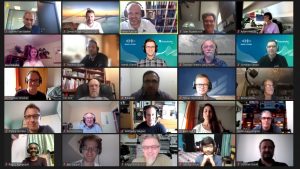
The research colloquium on MPEG-H audio provided an in-depth look at the technology and application of next-generation audio systems. Although MPEG-H was developed primarily by a research institute, it has already been standardized and has a variety of use cases around the world. Major productions such as the Rock in Rio festival, the Youth Olympic Games and the Eurovision Song Contest took advantage of the technology. To broaden the scope, MPEG-H can be used on a variety of playback devices and provides algorithms to process traditional stereo material to achieve an immersive MPEG-H experience.
Starting with the basics of the technology, the benefits of the system were highlighted and put into context with other next-generation audio systems and legacy audio codecs. The applications of MPEG-H audio can be summarized in the areas of immersive music, personalization, accessibility and next generation audio broadcasting. The presenters provided insights into all areas, combined with live presentations of classic stereo and new binaural playback. Based on traditional channel-based audio, where multiple source channels are mixed to a defined speaker configuration, and immersive audio, where audio objects are dynamically placed in a 3D space, MPEG-H combines all of these systems. Users can customize the audio experience by selecting different languages, modes and dialogue enhancement tools, which has been made audible and substantiated by results from online surveys and field tests.
We would like to thank the experts who shared their expertise and continued to discuss the topic of immersive sound from a development perspective.
A video of the presentation is available on YouTube.
